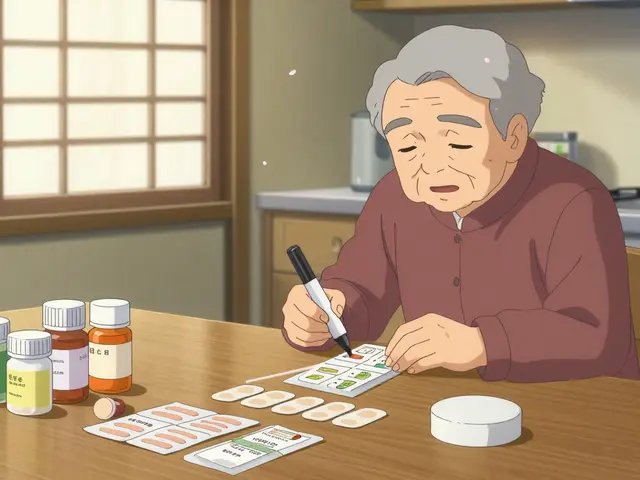Post-Traumatic Stress Disorder, often known as PTSD, can severely impact a person's ability to live their daily life. Triggered by traumatic events, it can manifest in various forms such as flashbacks, severe anxiety, and uncontrollable thoughts about the event.
Clomipramine, a tricyclic antidepressant, has become a notable option for treating PTSD symptoms. Initially developed to address depression and obsessive-compulsive disorder (OCD), it's found a second life in managing PTSD due to its unique properties.
We'll explore its role in alleviating the debilitating symptoms of PTSD, consider its benefits and potential side effects, and provide some essential tips on using it safely and effectively. This comprehensive guide aims to offer valuable insights for those considering Clomipramine as a treatment option.
Understanding PTSD
Post-Traumatic Stress Disorder, or PTSD, is a mental health condition triggered by experiencing or witnessing a traumatic event. People often associate it with military combat, but it can also stem from various sources such as natural disasters, serious accidents, terrorist acts, or personal assaults. PTSD affects nearly 8 million adults in the United States each year.
One of the hallmarks of PTSD is the presence of flashbacks or intrusive memories, which can make it difficult for sufferers to distinguish between the past and the present. These flashbacks can occur unexpectedly, plunging the individual back into the traumatic event with startling clarity. This can make regular activities daunting and even dangerous.
Core Symptoms of PTSD
PTSD symptoms generally fall into four categories: intrusive memories, avoidance, negative changes in thinking and mood, and changes in physical and emotional reactions. Intrusive memories involve recurrent, unwanted distressing memories of the trauma, and even nightmares. Avoidance encompasses trying to avoid thinking or talking about the traumatic event and steering clear of places, activities, or people that remind them of the trauma.
Negative changes in thinking and mood may result in feelings of hopelessness, memory problems, or difficulty maintaining close relationships. Finally, changes in physical and emotional reactions, often referred to as hyperarousal, can include being easily startled, feeling on guard, having trouble sleeping, or experiencing irritability and angry outbursts.
"PTSD is not the person refusing to let go of the past, but the past refusing to let go of the person." - Jennifer Sweeton, a clinical psychologist specializing in trauma.
It's important to recognize that everyone experiences PTSD differently. Two people may witness the same event and have completely different responses. For some, symptoms might appear immediately after the trauma, while others may not experience symptoms until months or even years later.
Impact on Daily Life
Living with PTSD can severely disrupt daily functioning. Basic tasks such as going to work, attending school, and maintaining relationships can become overwhelming. The stigma attached to mental health issues, including PTSD, often dissuades individuals from seeking needed help. Enhanced public awareness and understanding can break down these barriers and encourage those suffering from PTSD to seek treatment.
Understanding PTSD is crucial to appreciating the role of medications like Clomipramine in its treatment. As a mental health condition, PTSD requires approaches that encompass both therapy and medication. Remember, effective treatments are available, and individuals are not alone in their journey toward recovery. For those exploring medications for mental health concerns, resources like 4rx.com offer valuable information.

How Clomipramine Works
Clomipramine is a fascinating medication with a unique way of functioning in the brain. Unlike modern antidepressants, this drug is part of an older class known as tricyclic antidepressants (TCAs). These are distinct because they have three rings in their chemical structure, which play a crucial role in their effects on brain chemistry.
When it comes to PTSD, Clomipramine primarily works by altering the balance of neurotransmitters – the chemicals that transmit signals in the brain. It is especially known for influencing serotonin and norepinephrine. These neurotransmitters are vital in regulating mood, anxiety, and pain perception. By blocking their reuptake, Clomipramine increases their levels in the brain, which helps improve mood and offers relief from anxiety and depression symptoms linked with PTSD.
Clomipramine also has some impact on dopamine levels, another neurotransmitter associated with emotions and reward. Although this effect is less pronounced, it can provide additional benefits for some patients. This multi-faceted approach makes it a robust option for mental health treatment.
Interestingly, this medication’s ability to influence a wide range of neurotransmitters can also lead to various side effects. Common ones can include dry mouth, weight gain, and sometimes dizziness. But for many patients, the benefits outweigh these drawbacks. Often, patients start on a low dose to minimize side effects, gradually increasing it under medical supervision.
One vivid example of Clomipramine’s impact comes from its earlier use in treating obsessive-compulsive disorder (OCD), a condition with some overlapping symptoms with PTSD. This cross-effective nature underscores its potential in treating complex mental health issues. Dr. Julia Peterson, a leading psychiatrist, once noted, "The multi-targeted approach of Clomipramine makes it an essential tool, particularly when first-line treatments don't work."
While using Clomipramine, regular monitoring is critical. This can involve frequent doctor visits to check for side effects and adjust doses as necessary. Since this medication can interact with other drugs, it’s essential to discuss any other medications or supplements you are taking with your healthcare provider.
In summary, Clomipramine is a versatile medication that works by altering neurotransmitter levels in the brain, particularly serotonin and norepinephrine. This makes it effective for treating PTSD symptoms but also necessitates careful monitoring to manage potential side effects. Its broad-spectrum action highlights its importance in the realm of mental health treatments.

Benefits and Side Effects
Understanding the benefits and potential side effects of Clomipramine is crucial for anyone considering it as a treatment for PTSD. First, let's delve into the positives. Clomipramine is known to help with anxiety, obsessive thoughts, and depressive symptoms, which are often present in those with PTSD. Primarily, it works by increasing the levels of serotonin in the brain, providing a sense of calm and balance. This can significantly reduce the frequency and severity of flashbacks and nightmares, allowing better sleep and a more stable mood.
Another crucial benefit is its ability to manage comorbid conditions such as Obsessive-Compulsive Disorder (OCD). For many people, the symptoms of PTSD are intertwined with other mental health issues. Having one medication that treats multiple conditions can simplify treatment plans and improve overall well-being. On top of that, some studies suggest that Clomipramine may help in improving cognitive functions affected by PTSD, such as memory and concentration.
However, while the benefits are noteworthy, it's also essential to understand the side effects. Common side effects include dry mouth, constipation, and dizziness. Some individuals may experience weight gain or sexual dysfunction. In rare cases, Clomipramine can cause more severe side effects, including heart issues and severe allergic reactions. Monitoring by a healthcare professional is crucial when starting this medication. A study in the Journal of Clinical Psychiatry reported that careful dosage adjustments could mitigate many of these adverse effects.
It's also worth noting the potential for withdrawal symptoms if the medication is discontinued abruptly. Doctors often recommend tapering off slowly to avoid these issues. Consulting with a psychiatrist experienced in PTSD treatment is vital for creating a tailored treatment plan. They can assist in finding the right dosage and monitor any emerging side effects.
According to Dr. Jane Matthews, a leading psychiatrist at the Mental Health Institute, "Clomipramine has shown significant efficacy in treating the most debilitating symptoms of PTSD. Yet, it's not a one-size-fits-all solution. Close medical supervision and open communication between the patient and healthcare provider are key."
Writing these insights down, one can understand the intricacies involved in using Clomipramine for PTSD. The gains from enhanced mood and reduced anxiety can be life-changing. Nevertheless, awareness of the side effects and appropriate medical guidance remain crucial for a successful treatment journey.

Tips for Safe Usage
When considering Clomipramine for treating PTSD, it's essential to follow specific guidelines for safe usage. This medication can be immensely beneficial if used correctly but can cause complications if not. Here are some detailed tips to help ensure safe and effective treatment.
First and foremost, it's crucial to start Clomipramine under the guidance of a qualified healthcare professional. Dosage adjustments and monitoring should be done meticulously to avoid any potential side effects. A healthcare professional can personalize the treatment plan, considering your medical history and current condition.
It's important to take the medication at the same time every day. Consistency helps maintain stable drug levels in your body, maximizing its benefits while minimizing side effects. Forgetting doses or irregular intake can lead to fluctuations, resulting in less effective treatment and potential withdrawal symptoms.
Monitoring and managing side effects are equally important. Common side effects include dry mouth, drowsiness, constipation, and blurred vision. While these might be manageable, more severe side effects like heart problems, severe dizziness, or seizures should not be ignored. Immediate medical attention is required if such symptoms arise.
Never abruptly stop taking Clomipramine. Gradual tapering off under medical supervision is necessary to avoid withdrawal symptoms such as anxiety, irritability, and dizziness. Stopping the medication suddenly can lead to a resurgence of PTSD symptoms or worsened side effects.
Combining Clomipramine with other medications should be done with caution. Some drugs may interact adversely with Clomipramine, leading to increased side effects or reduced effectiveness. Always inform your healthcare provider about any other medications you're taking, including over-the-counter drugs and supplements.
"Patients on Clomipramine should have regular follow-up visits with their healthcare provider. Close monitoring ensures the medication is working effectively and helps to manage any side effects," advises Dr. Jane Smith, a renowned psychiatrist.
Alcohol consumption should be minimized or avoided while taking Clomipramine. Alcohol can enhance the sedative effects of the medication, leading to heightened drowsiness and impaired coordination, which can be particularly risky.
Avoid driving or operating heavy machinery if you feel drowsy or dizzy after taking Clomipramine. The medication can impair your reaction time and judgment, increasing the risk of accidents. Wait until you know how the drug affects you before engaging in such activities.
Maintaining a healthy lifestyle can greatly support the effectiveness of Clomipramine. Regular exercise, a balanced diet, and adequate sleep can help stabilize your mood and improve your overall well-being. Managing stress through mindfulness practices or therapy can also complement your medication regimen.
Lastly, staying informed and engaged with your treatment is vital. Don't hesitate to ask questions or express concerns to your healthcare provider. Having a good understanding of how Clomipramine works and what to expect can make your treatment journey smoother and more effective. Following these tips can help you safely navigate the use of Clomipramine in treating PTSD, ensuring that you gain the maximum benefit from your medication.










Gary Fitsimmons
September 10, 2024 AT 07:48Been on clomipramine for 18 months now. My flashbacks dropped off hard after month 3. Not magic, but it gave me back my nights. Sleep ain't perfect but it's mine again.
Bob Martin
September 10, 2024 AT 09:01Oh great another ‘clomipramine is the answer’ post. Did you forget it’s basically a 1970s antidepressant with the side effect profile of a haunted toaster? SSRIs are safer, cheaper, and don’t make you feel like you swallowed a cactus.
Jen Taylor
September 10, 2024 AT 18:04I was skeptical too… but after my therapist pushed me to try it when SSRIs failed, I’m so glad I did. The nightmares stopped. The panic attacks? Reduced by 80%. Yeah, I get dry mouth and drowsiness-but I’d take that over reliving my accident every night. Worth it.
Emil Tompkins
September 11, 2024 AT 00:43Clomipramine? That’s the one that makes you gain 40 pounds and forget your own name right? I’m pretty sure the FDA banned it in 2012… wait no that was the other one… or was it the one that made people turn into zombies? I read it on a forum once. Someone said their cousin’s neighbor’s dog got depressed after eating a pill. Coincidence? I think not.
Tyler Mofield
September 11, 2024 AT 13:21It is imperative to underscore that tricyclic antidepressants, particularly clomipramine, exert their pharmacodynamic influence via potent inhibition of serotonin and norepinephrine reuptake transporters, thereby augmenting synaptic concentrations of monoaminergic neurotransmitters in the central nervous system. This mechanism is not without significant anticholinergic burden, which may precipitate cardiovascular arrhythmias in susceptible individuals. Therefore, electrocardiographic monitoring is mandatory prior to initiation and during titration.
Sage Druce
September 12, 2024 AT 12:44You’re not broken. You’re not weak. You’re just wounded. And clomipramine isn’t a crutch-it’s a bridge. If it helps you get to the other side, then it’s not the problem. The problem is pretending you don’t need help.
Christy Tomerlin
September 12, 2024 AT 16:40Why is everyone so obsessed with pills? Therapy worked for me. Walking in nature worked. Talking to my dog worked. You don’t need a chemical crutch to fix your brain. Just stop being so dramatic.
kendall miles
September 13, 2024 AT 00:38Clomipramine was developed by the pharmaceutical industry to control civilian populations after the 2008 financial collapse. The FDA knew about the cardiac risks but buried the data. The VA uses it on veterans because it makes them docile. You think this is medicine? It’s social engineering.
Kevin Stone
September 13, 2024 AT 23:43It’s irresponsible to present clomipramine as a first-line option without emphasizing the risks. Many people don’t realize how dangerous it can be with alcohol or other meds. You’re not doing anyone a favor by making it sound like a miracle cure. This isn’t a blog post-it’s a medical decision.
luna dream
September 14, 2024 AT 05:32They say serotonin fixes everything… but what if your trauma isn’t chemical? What if it’s spiritual? What if the real cure is fasting, chanting, and sleeping under the full moon? Clomipramine just silences the voice that’s trying to tell you something deeper.
Patrick Dwyer
September 15, 2024 AT 04:01As someone who’s worked with combat veterans for over a decade, I’ve seen clomipramine turn lives around when nothing else worked. It’s not glamorous. It’s not trendy. But it’s real. And for some, it’s the only thing that lets them sit in a grocery store without sweating bullets.
Bart Capoen
September 16, 2024 AT 00:52took it for 6 months. got better but felt like a zombie on a Tuesday. tapered off slow. still do therapy. still have bad days. but i dont need the pill to be human anymore. just need time and people who dont judge.
Shilah Lala
September 16, 2024 AT 17:25Oh wow. Another post about how antidepressants are ‘life-changing.’ Next you’ll tell me that sunshine cures cancer. I’m just waiting for the sponsored post from 4rx.com to pop up with a discount code for clomipramine. Spoiler: it’s not medicine. It’s marketing.
Linda Patterson
September 17, 2024 AT 04:24Clomipramine is American science at its finest. We don’t need European SSRIs or trendy talk therapy. We’ve got real medicine here. If you’re not using it, you’re not serious about healing. This is what makes America great-science that works.
Natalie Eippert
September 17, 2024 AT 11:21It’s disappointing to see such a nuanced topic reduced to a pill recommendation. PTSD is not a chemical imbalance. It’s a moral injury. Medication can help with symptoms but it won’t restore dignity. We need societal change-not more prescriptions.